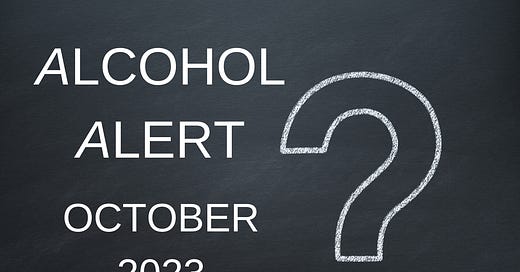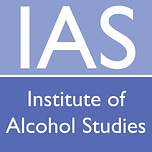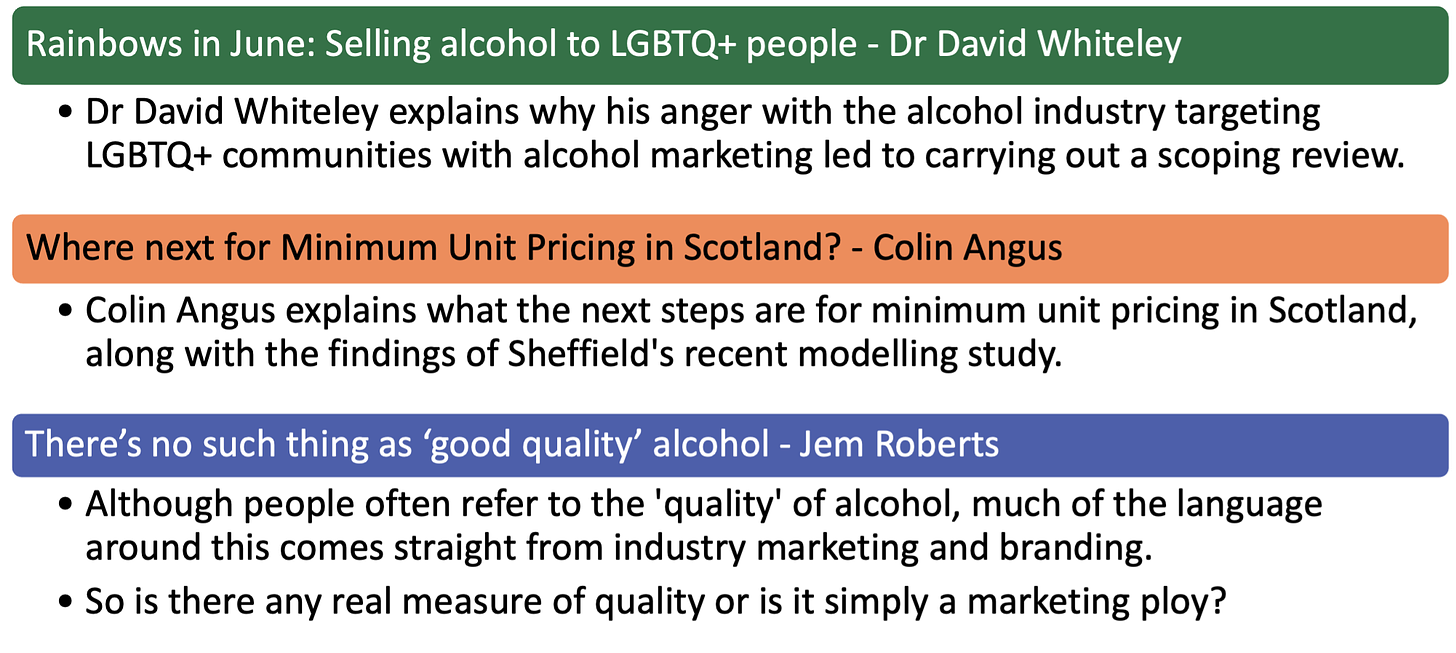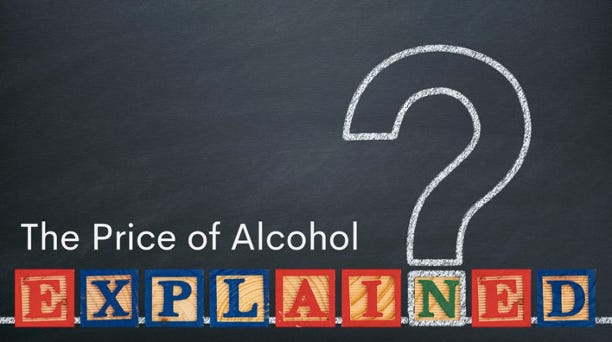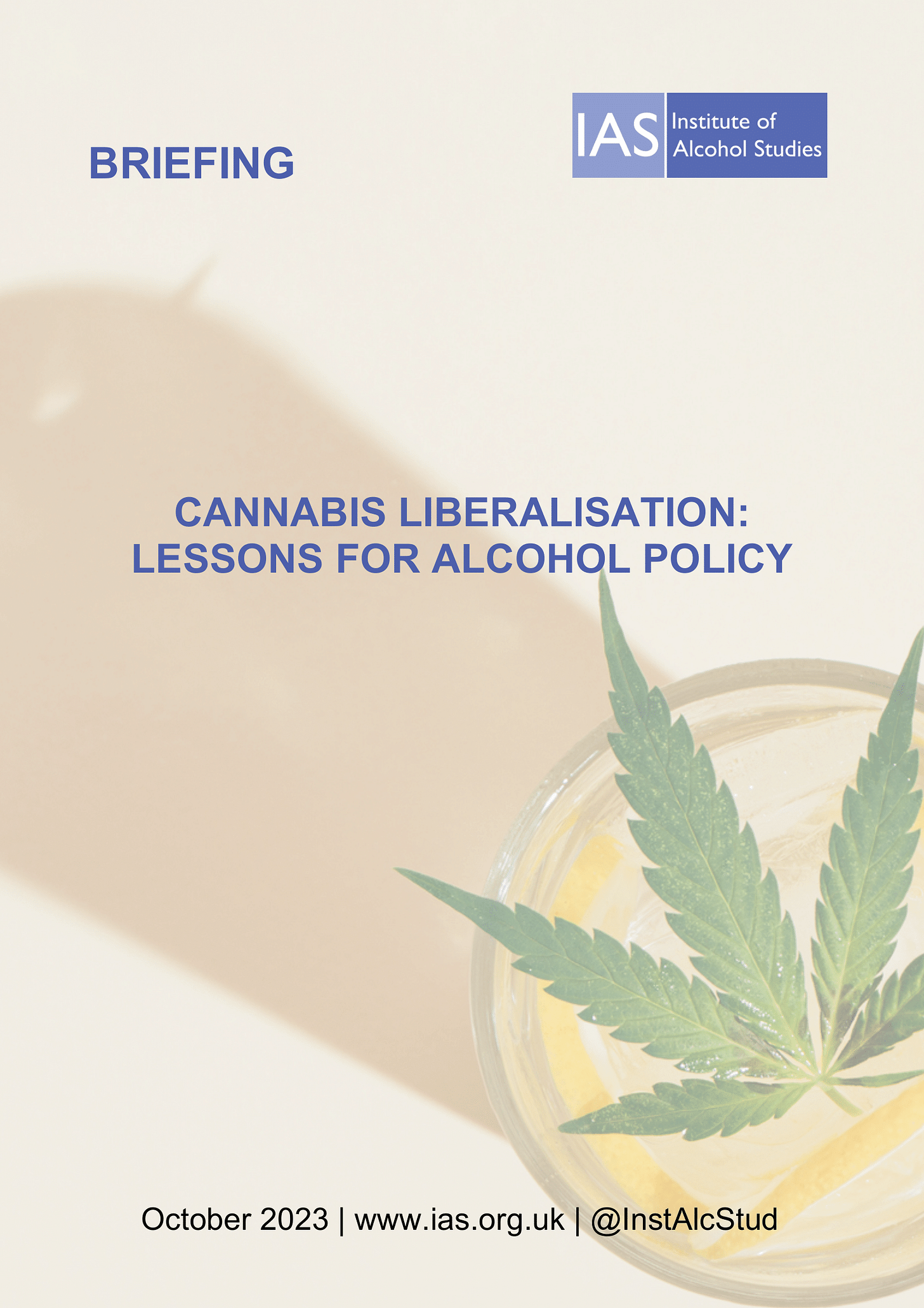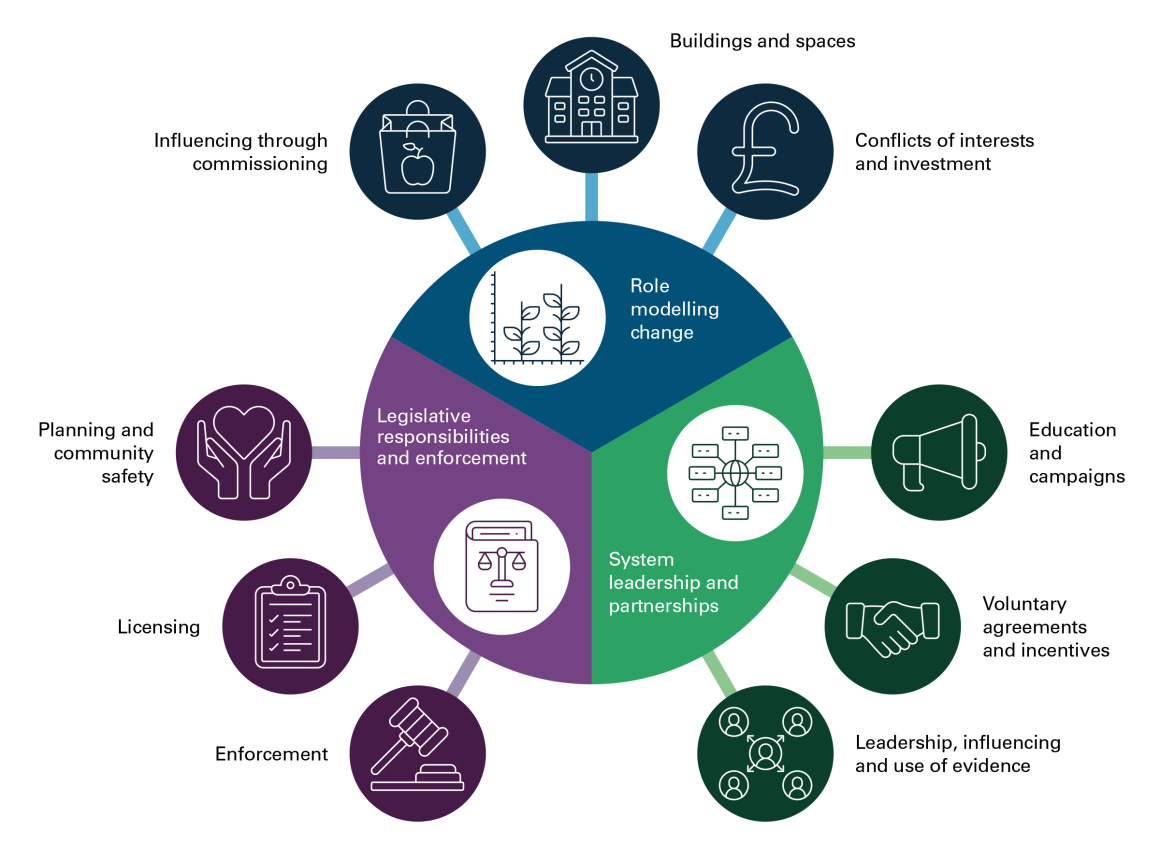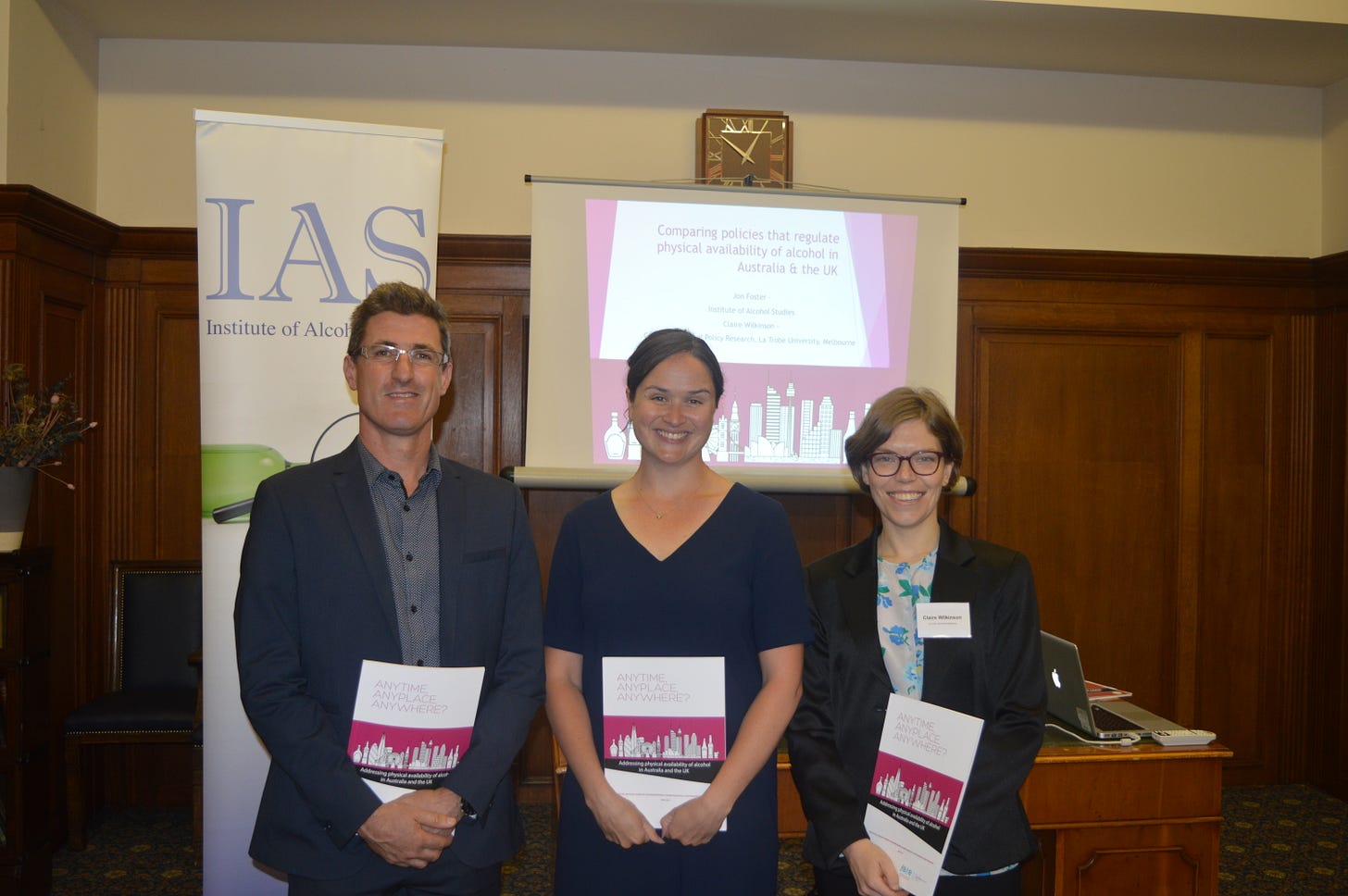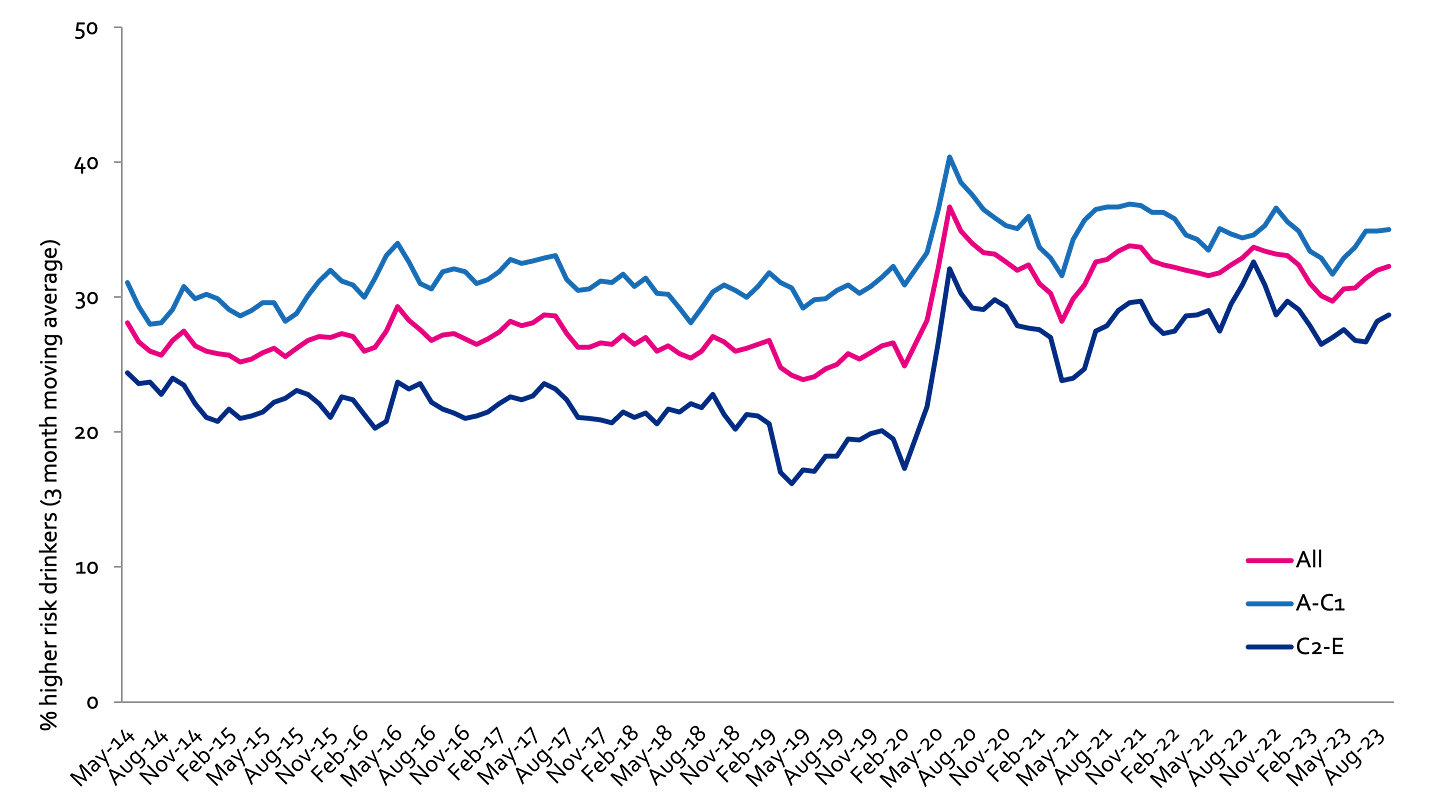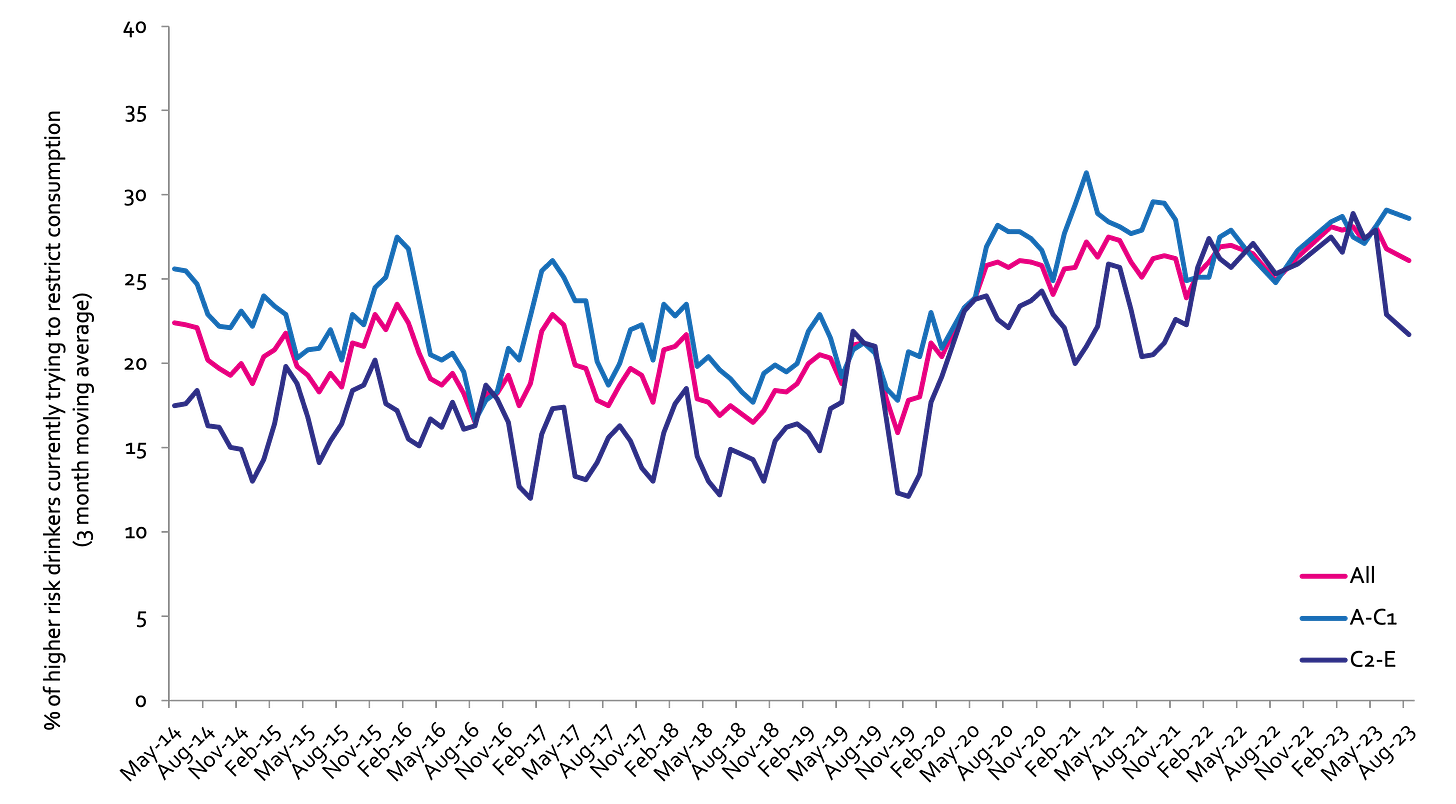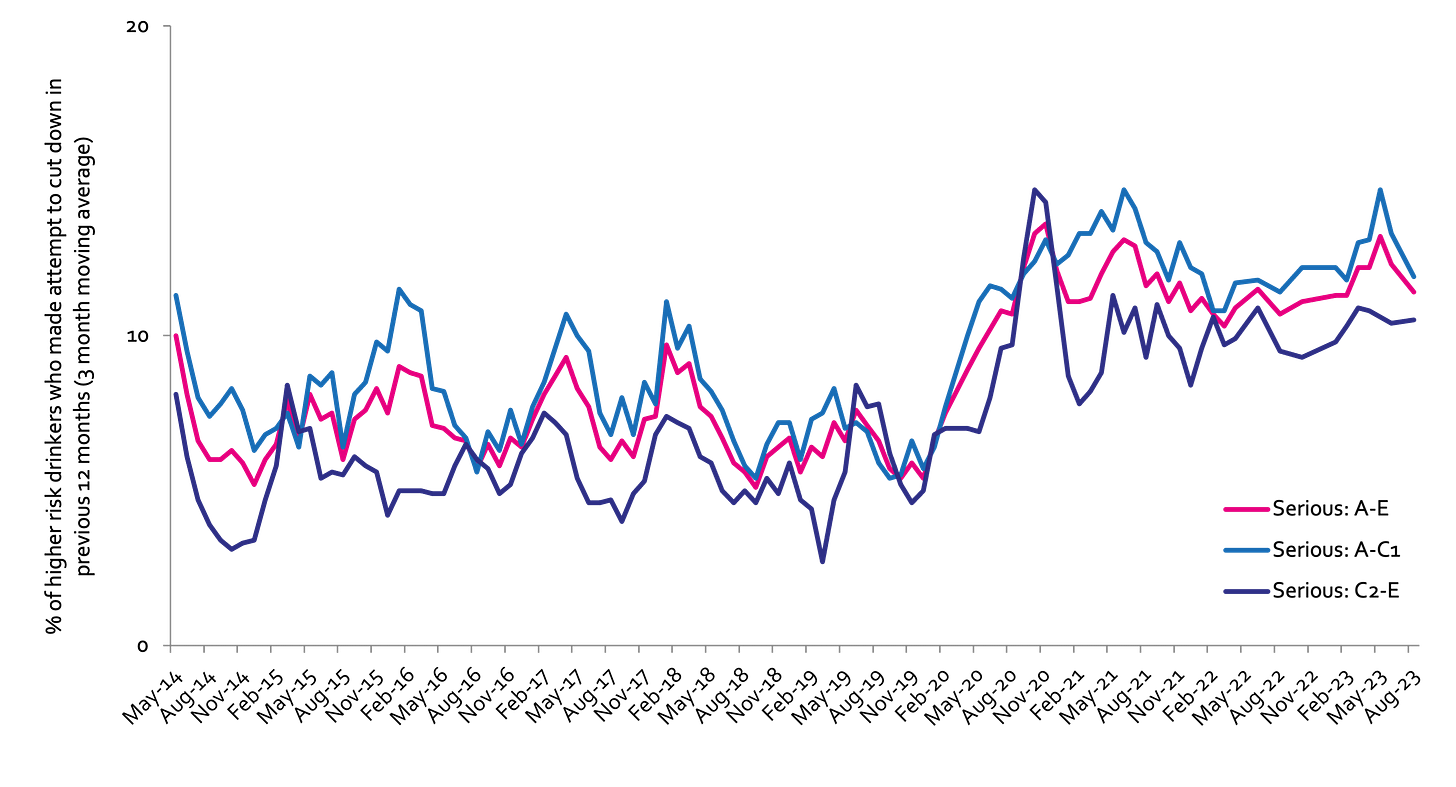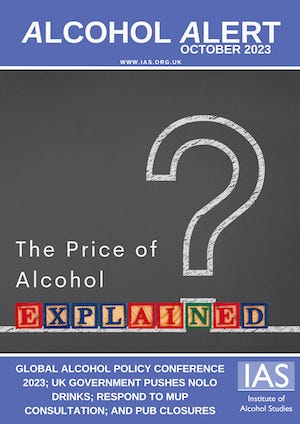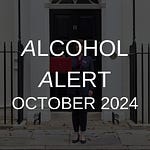Hello and welcome to the Alcohol Alert, brought to you by The Institute of Alcohol Studies.
In this edition:
IAS blogs
The Price of Alcohol: Explained
IAS and AHA’s ‘Alcohol News’ morning briefing
The Global Alcohol Policy Conference 2023 🎵 podcast feature 🎵
UK government pushes for increase in no- and low-alcohol drinks
Royal College of Physicians Edinburgh “fully supports” uprating MUP to 65p
Cannabis liberalisation and lessons for alcohol policy
Local government action on addressing risk factors for ill health
Pub closures continue but employment in sector increases
No new alcohol measures in Ireland’s Budget for 2024
Alcohol Toolkit Study: update
We hope you enjoy our roundup of stories below: please feel free to share. Thank you.
IAS blogs
To read blogs click here.
The Price of Alcohol: Explained
We’re pleased to launch the second film in our Explained series, entitled: The Price of Alcohol: Explained.
Reducing the affordability of alcohol is one of the most powerful tools at the UK government’s disposal to tackle alcohol harm. At the same time, capping the price of a pint is a frequent political tool deployed to appeal to the public. So what is the real relationship between cost and consumption, and how does this impact the nation’s health and the economy?
The film explains how the cost of alcohol impacts consumption rates and subsequent harm, how alcohol duties have changed over time, how minimum unit pricing works and whether it is effective in reducing drinking, and the cost of alcohol harm to the economy.
Featuring health economist Colin Angus of the University of Sheffield and Dr Aveek Bhattacharya of the Social Market Foundation think tank.
Please share the film with relevant colleagues and on social media.
IAS and AHA’s ‘Alcohol News’ morning briefing
Each morning, IAS and the Alcohol Health Alliance collate and share the previous day’s news on alcohol policy and research. We share this with colleagues in the sector.
Do let us know if you would like to be added to the mailing list by emailing Jem at jroberts@ias.org.uk.
The Global Alcohol Policy Conference 2023 🎵 podcast feature 🎵
The 7th Global Alcohol Policy Conference was held last week in Cape Town, with a focus on “Investing in people before profits: building momentum towards the Framework Convention on Alcohol Control.”
The conference – which was attended by alcohol policymakers, researchers, advocates, and civil society groups – was an excellent opportunity for colleagues to learn from each other and discuss next steps in the global struggle to reduce alcohol harm.
The final plenary included Professor David Jernigan presenting the conference declaration, which stated:
“We, the 521 participants from 55 countries gathered at the 7th Global Alcohol Policy Conference in Cape Town, South Africa from October 24-26, 2023:
· Recognise alcohol’s significant burden of disease and as a major barrier to the achievement of the Sustainable Development Goals.
· Call on our national governments to recognise the alcohol industry’s conflict of interest with effective alcohol policies, and to establish clear rules separating the industry from engagement with policy development.
· Call on WHO Member States to direct the WHO Director-General and other intergovernmental organisations to:
o Study the necessity and feasibility of a legally binding instrument to strengthen the public health response to alcohol consumption and related harm, through consultation with nation states and civil society.
o Report the findings through the Executive Board to the World Health Assembly.”
In this month’s podcast we spoke to a number of the conference attendees about what they had found most enlightening during the three days, as well as what they hoped people would take away from the conference.
UK government pushes for increase in no- and low-alcohol drinks
The government is consulting on no- and low-alcohol drinks, with the aim of increasing the products on offer in order to reduce alcohol harm. The consultation closes on 23 November 2023.
In its press release, the Department of Health and Social Care (DHSC) stated that one of the proposals is to label drinks with strength of 0.5% ABV or less as ‘alcohol free’. This is currently done in many countries already, but in the UK 0.05% is deemed alcohol free. Having said that, many products with 0.5% ABV already label themselves as ‘alcohol free’ in the UK. For example, this product by a Bristol beer producer:
DHSC stated that:
“Potential changes will make no and low-alcohol drinks more popular and easier to buy, helping shift the market to healthier alternatives.”
They went on to say that with a higher threshold, more products could come onto the market, as it could make it easier for companies to manufacture these drinks.
Public Health Minister Neil O’Brien said:
“Liberalising labelling guidelines could also help people make more informed choices about the drinks they buy.
“Reducing the harms associated with excess alcohol consumption remains a priority for this Government. As of 2021, approximately 10 million, or 1 in 5 adults in England drank above the UK Chief Medical Officer’s low risk drinking levels, significantly increasing their risk of health problems.”
Industry leaders welcomed the consultation, including Matt Lambert, CEO of The Portman Group, who said:
“We welcome the new consultation, which we hope will help result in greater clarity on labels and encourage further uptake of low and no alcohol alternatives.”
Public health groups are wary about the government’s focus on no- and low-alcohol products, as it distracts from policies that have a far greater evidence-base and are needed more urgently. There is no evidence that these products, which currently make up less than 5% of the UK drinks market, will help reduce alcohol consumption at a population level and it frames the problem as an individual one, reinforcing alcohol industry narratives that it is about ‘personal responsibly’. It also positions the alcohol industry as part of the solution and legitimises them as health partners, when it is illogical for them to be part of the solution to the harm they cause.
Another concern is that a focus on this will take up an inordinate amount of time for civil servants and ministers, when they could be focusing on evidence-based policies. The alcohol industry is already planning on pushing these products as part of their strategic plans, particularly in the Global North due to the reduction in young people consuming alcohol. Along with the fact that many 0.5% products already label themselves as ‘no-alcohol’ or ‘alcohol-free’, this action by the government is highly unlikely to have an effect on product options or a reduction in harm.
Royal College of Physicians Edinburgh “fully supports” uprating MUP to 65p
The Scotsman published an article on 10 October stating that the Royal College of Physicians Edinburgh “fully supports” uprating MUP to 65p, to counteract its erosion by inflation.
Professor Andrew Elder, president of the RCPE, said:
“This is vital as its efficacy has been eroded by the high levels of inflation we have experienced in recent years. We would encourage all those who support MUP and want to see it have even more success in helping reduce alcohol harms to have their say in the consultation.”
Dr Alastair MacGilchrist, chair of Scottish Health Action on Alcohol Problems, said:
“Scotland’s alcohol crisis is worsening year on year and drastic and immediate intervention is required. A wide package of measures to address this is essential and MUP is a vital component which we cannot afford to lose, especially as alcohol harms continue to rise and in light of the projected harms modelled by the Sheffield Alcohol Research Group.”
The consultation closes on 22 November. IAS would encourage people to respond to the consultation using the online form here. There are only three questions:
Do you think Minimum Unit Pricing (MUP) should continue? [Yes/No]
If MUP continues, do you agree with the proposed Minimum Unit Price of 65 pence? [Yes/No]
We invite comments on the Scottish Ministers’ proposal to continue MUP, and the proposed Minimum Unit Price of 65 pence. [Open question]
If you have any questions regarding the policy or consultation, do contact us and we can either answer or signpost you to the best person (jroberts@ias.org.uk).
Cannabis liberalisation and lessons for alcohol policy
Cannabis use is becoming increasingly liberalised across the world, and the co-use of cannabis and alcohol is complex but important to understand.
Earlier this year, IAS convened an expert roundtable to discuss what the UK can learn from other jurisdictions on the impacts and outcomes of non-medical cannabis legalisation for alcohol use and harm.
From the discussion we have published a briefing, which explains:
Changes in Public Opinion, Patterns of Use, and Cannabis and Alcohol Co-Administration
Impact of Cannabis Legalisation on Drug and Alcohol Services
Public Health and Social Justice Considerations in Different Cannabis Legalisation Models
Commercial Determinants of Health and Corporate Capture
Concerns around the liberalisation of cannabis include the significant issues regarding alcohol regulation in the UK, and that if the UK moves towards cannabis legalisation it should ensure the power of commercial entities is sufficiently limited through regulation of price, availability and marketing.
Local government action on addressing risk factors for ill health
The Health Foundation has developed a briefing that sets out a framework for population-level actions that local governments can work towards to reduce harm from alcohol, tobacco, and junk food.
In the briefing, the charity explains that due to recent governments shying away from necessary population-level policy action, local authorities have continued to lead efforts. The briefing:
This includes sharing examples of what councils are doing in tackling risk factors, so that other councils can learn from them.
The framework identifies nine mechanisms across three domains for how local authorities in England can tackle these risk factors:
Pub closures continue but employment in sector increases
Data from real estate analysts Altus Group shows that 383 pubs across the UK were closed in the first six months of 2023, almost matching the total for the whole of 2022. Closures were particularly high in London, with 46 venues closing.
However, the BBC explained that while pubs have closed in recent years, employment in the sector has actually increased due to the average pub becoming larger. Again, this was particularly the case in London:
“While the decline in pub numbers reflected an overall UK trend, the number of employees increased by more in London (12%) than the average across the country (3%).”
The government said it was helping venues by providing 50% business rates relief and freezing alcohol duty rates.
Alex Probyn, president of property tax at Altus Group, said:
"With energy costs up 80% year-on-year in a low growth, high inflation and high interest rates environment, the last thing pubs need is an average business rates hike of £12,385 next year.”
A government spokesperson said:
"We recognise that pubs are key drivers of local economies, but no national government can control the global factors pushing up the price of energy and other business costs.”
In response to a Parliamentary Question from Labour MP Ruth Jones, who asked about the number of pubs that have closed, Exchequer Secretary Gareth Davies responded that:
“We do believe that pubs make an important contribution to our culture, fostering a sense of place and community, and the UK economy. And we understand the challenges pubs are facing.
“That is why the alcohol duty system, implemented in August, included a new Draught Relief that provides a significant duty discount on alcohol sold in containers of 20 litres or more in the on-trade. As well as this, the Government’s ‘Brexit Pubs Guarantee,’ confirms that the duty on a draught pint will always be lower than its equivalent in a supermarket.”
No new alcohol measures in Ireland’s Budget for 2024
Following Ireland’s Budget 2024 announcement, both Alcohol Action Ireland (AAI) and the Drinks Industry Group of Ireland (DIGI) voiced disappointment, as no new measures around alcohol have been announced.
AAI has been calling for a polluter pays model, the establishment of an Alcohol Harm Reduction office, and increased treatment funding. Dr Sheila Gilheany of AAI said:
“Today the Minister for Finance rightly used a public health imperative to further tax tobacco products, it is deeply disappointing that no such parity applies when it comes to alcohol and public health. This, while evidence increasingly demonstrates that alcohol harms costs more than harms caused by tobacco. We can only surmise that the powerful alcohol lobby still wields significant influence over the political process.”
DIGI’s chair, Kathryn D’Arcy (of Irish Distillers, a subsidiary of Pernod Ricard), said the Budget failed to grasp the impact of VAT increases and duties on the industry:
“We need to collectively refocus on how we approach excise rates, particularly given the competitive advantage European countries enjoy and what this means for the tourism and hospitality sector.”
In memoriam: Professor Kypros Kypri
Professor Kypri supporting the launch of IAS’s report ‘Anytime, Anyplace, Anywhere? (2017)’
IAS was saddened to learn of the tragic passing of Professor Kypros Kypri, a leading health researcher based at the University of Newcastle, Australia. Professor Kypri’s research included evaluation of the impact earlier closing times for licensed premises had on assault rates in Newcastle. This evidence informed decisions to adopt similar availability restrictions in Sydney and Queensland. Remembering Professor Kypri, known as Kyp, chief executive Dr Katherine Severi commented:
“Kyp was an outstanding researcher whose influential work played a major role in tackling alcohol-related violence. His enthusiasm was infectious and his determination for evidence to prevail over industry misinformation leant support for life-saving policies. He was a delight to work with and we express our deepest sympathies to his family and loved ones.”
Alcohol Toolkit Study: update
The monthly data collected is from English households and began in March 2014. Each month involves a new representative sample of approximately 1,700 adults aged 16 and over.
See more data on the project website here.
Prevalence of increasing and higher risk drinking (AUDIT-C)
Increasing and higher risk drinking defined as those scoring >4 AUDIT-C. A-C1: Professional to clerical occupation C2-E: Manual occupation
Currently trying to restrict consumption
A-C1: Professional to clerical occupation C2-E: Manual occupation; Question: Are you currently trying to restrict your alcohol consumption e.g. by drinking less, choosing lower strength alcohol or using smaller glasses? Are you currently trying to restrict your alcohol consumption e.g. by drinking less, choosing lower strength alcohol or using smaller glasses?
Serious past-year attempts to cut down or stop
Question 1: How many attempts to restrict your alcohol consumption have you made in the last 12 months (e.g. by drinking less, choosing lower strength alcohol or using smaller glasses)? Please include all attempts you have made in the last 12 months, whether or not they were successful, AND any attempt that you are currently making. Q2: During your most recent attempt to restrict your alcohol consumption, was it a serious attempt to cut down on your drinking permanently? A-C1: Professional to clerical occupation C2-E: Manual occupation
The UK Alcohol Alert (incorporating Alliance News) is designed and produced by The Institute of Alcohol Studies. Please click the image below to visit our website and find out more about us and what we do, or the ‘Contact us’ button. Thank you.

